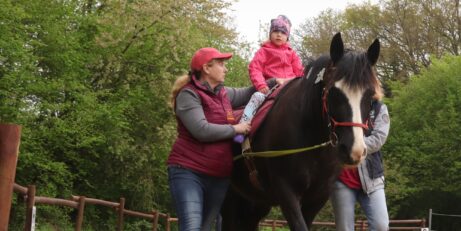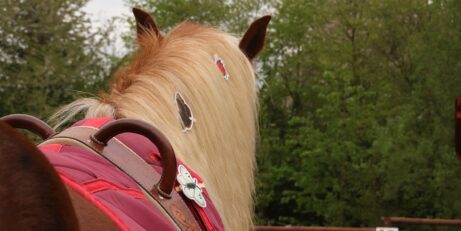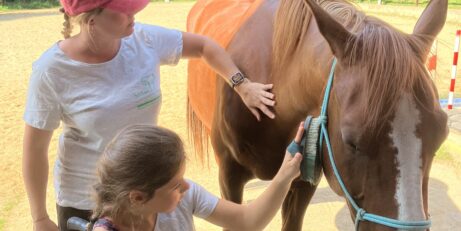Why Hippotherapy became Equine Facilitated Therapy?
European Equine Facilitated Therapy Network (EEFTN) is a group of Equine Facilitated Therapy associations and practitioners from all over Europe to bring them together to get an agreement over the terminology, work on recognition of hippotherapy, share and exchange of best practice and education models. EEFTN connects therapists on the international level; however, it promotes national associations and the cooperation of practitioners within their countries. HETI supports EEFTN in establishing Connection, Communication and Collaboration between organisations and people in European Equine Facilitated Therapy community.
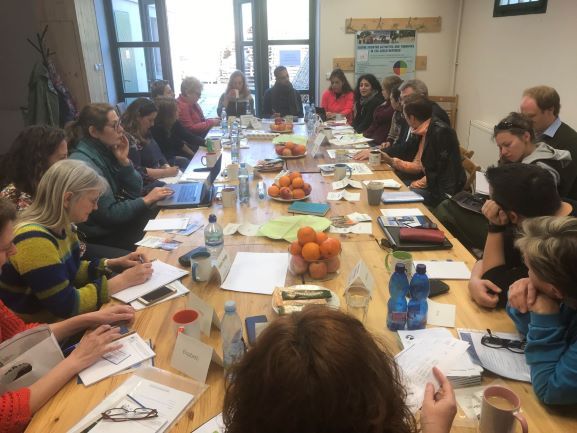


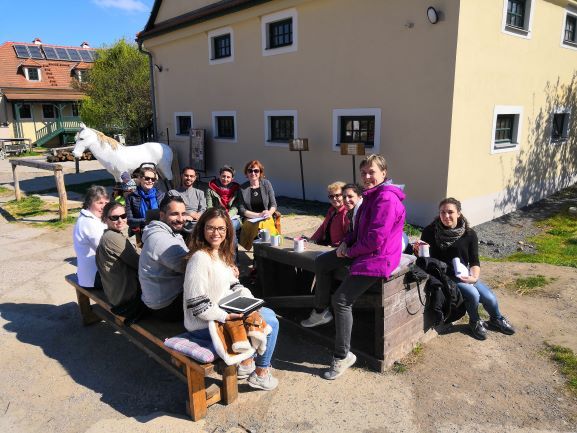
Why Hippotherapy became Equine Facilitated Therapy?
Have you ever noticed how the meaning of the term „Hippotherapy“ differs around the world? And there are so many varieties among the applied professions and in the execution of hippotherapy as well. It always hits me at the HETI congresses. I am never sure what I am going to hear if I choose to attend a particular lecture. And I am aware I am not the only one. This confusion is not only among us, but it affects the actual (non)acceptance of hippotherapy as a recognised rehabilitation method.
After the HETI Congress in Dublin, I decided to take action and connect the European therapists incorporating hippotherapy in their treatment strategy to find some common ground to communicate, share the best practice and promote hippotherapy. We need to unite to be stronger to achieve our goals.
In January 2019, I sent email invitations to my friends and colleagues to come to Prague in April and hoped for their interest. To my surprise, calling for the European Hippotherapy Association Network became a success. Twenty-five participants from 13 countries, including the HETI president, applied. The following nations were represented: Spain, Italy, Czech Republic, Greece, Russia, Malta, Finland, United Kingdom, Norway, Ireland, Poland, Latvia and Lithuania. All participants arrived with open minds and a willingness to listen to the opinions of others. We had a great weekend together. We had to accept the below points to be able to build a strong connection:
- We agreed that hippotherapy means using the movement of horseback by a healthcare professional with a strong background in human kinesiology, anatomy and physiology.
- Even though we are all European, our ways of rehabilitation approaches are different. They are influenced by our national history, traditions, healthcare systems, funding, legislation and culture.
- The education systems and competencies for a particular profession (e.g. physiotherapist) vary significantly.
- The contents of educational courses, the scale of skills and competencies for therapists applying hippotherapy are heterogeneous.
- We have a different view on safety in general.
- It doesn’t mean that one approach is better than the other one.
The organisation of the meeting
Before our meeting, all participants submitted an extensive electronic survey that resulted in an overview of each country, health care and educational systems, legislation, the position of hippotherapy in the rehabilitation system and the funding. Everybody could get familiar with the results before their arrival.
The network was opened with a workshop led by Anne Rokka, head of hippotherapy education and Sanna Mattila-Rautiainen, hippotherapy teacher, both from Finland. The workshop was about equine and human movement. We all took something with us to consider.
Friday afternoon was dedicated to the introduction of all participants in short PowerPoint presentations. Then we discussed the network program and selected these main topics: common terminology, exchange of best practice and communication within the network. On Saturday, we divided into three groups to brainstorm on selected topics. We came to these conclusions:
Terminology: Because the term hippotherapy has a very different meaning across professions and countries, it makes it very hard to communicate with each other and compare research. The group agreed that it wanted a term which included clarity about the profession providing the therapy, that the treatment was facilitated by an equine and that it was a clinical treatment following an individual assessment of the client. Documentation is used to note the assessment and treatment results with appropriate outcome measures. After a lengthy discussion, the majority of the group decided that it would be better to use the term Equine Facilitated Therapy (EFT) instead of Hippotherapy. Using the term Equine Facilitated Physiotherapy or Equine Facilitated Speech and Language Therapy, for example, would make it clear what kind of therapy was being delivered with the use of an equine. This term can then also be used as Medical Subject Headings (MeSH terms) for medical databases such as MEDLINE®/PubMED®. It also meant that the name European Hippotherapy Association Network was changed to European Equine Facilitated Therapy Network (EEFTN).
Best Practice: A large number of subjects were touched upon, which need further exploration in future meetings as well as online. The subjects were horse welfare, education, discharge and transition planning, session types, outcome measures, resources, equipment, research and communication.
Communication: To continue our networking and exchange of ideas EEFTN, we use the WhatsApp group and emailing as it is a fast and comfortable connection.
We utilised Sunday morning for forming an education sub-committee to develop a process for acquiring an Equine Facilitated Therapy Certificate, which would allow professionals practising EFT to gain recognition in other European countries to practise. The ideas are to develop an online exam and submission video evidence.
The weekend was very productive and delightful. We managed to get along and find compromises and solutions. We also built friendships and saw each other at various meetings, courses and conferences.
2nd EEFTN meeting
The next meeting will take place from 30th April to 2nd May 2020 in Saint Petersburg, Russia.
Spoken language: English
Agenda:
- Education model for Europe
- Terminology update
- Model of sharing and exchange of best practice
- Funding and promoting hippotherapy
- Research
Who can attend:
- Representatives of a European National Equine Facilitated Association.
- In the case of no existing association, a single participant can join the network on behalf of her/his country with knowledge about education, policy and procedures in EFT, etc.
- Maximum of 4 participants from each country.
- Professions: Physiotherapists, Occupational Therapists, Speech and Language Therapists, Psychologists, as well as Association representatives.
- Overseas guests are welcome to join our fruitful discussion and inspire us with their expertise.
Věra Lantelme-Faisan
Physiotherapist
Chairwoman of EFTA-CR (The Equine Facilitated Therapy Association of the Czech Republic)
May 2019
Enjoyed this article? Download our free e‑book “10 Essential Insights into Equine Assisted Services” and discover practical tips you can start using today.
Would you like more inspiration, ideas, and professional insights? Join our Svítání newsletter and never miss an article, event, or course update.
Curious to deepen your knowledge in Equine Assisted Services? Explore our courses designed by experienced practitioners and start your learning journey with Svítání today.
